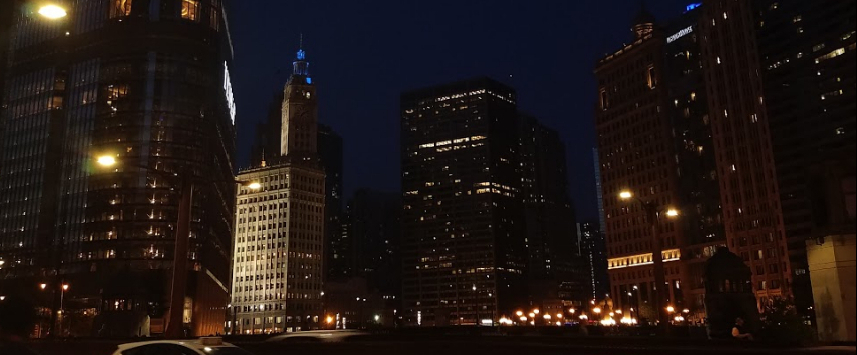This past April, North Park held the first-ever Cornerstone Writing Awards, an event that recognized exemplary first-year student writing in four categories: "Comparison," "Analysis," "Narrative," and "Reflective." Winning writers received a $100 prize as well as the opportunity to read their work to an audience comprised of Cornerstone peers and faculty.
This essay is the winner of the Reflective category and was written for Nanci Calimari's class.
Racism. Is there hope?
In Norway, my home country, we have heard the tales about American racism, about slavery, hate crimes and even the Ku Klux Klan. Yet most of us have never heard about the Children March or about James Baldwin; just Martin Luther King. So, this was all brand-new information when we watched a video on the Children March as well as interviews and articles about James Baldwin and Bobby Kennedy. I knew the problem of racism had existed, but I had not really bothered to go and dig into the resources myself. But I'm happy I eventually received this information because it makes me even more empathetic towards the African American community and what they had to face in what was supposed to be a country of freedom and liberty.
The video on the Children's March was what stuck out to me the most. I saw a united people, a united African-American culture which was willing to sacrifice the safety of their children in order to try to secure it later on. There is something so powerful by using children, the ultimate symbol of innocence. These innocent children agreed to be sent to jail, despite them being the least qualified to go. But it wasn't even the idea of innocent children going to jail that made me so emotional; what struck my heart was their numbers. Hundreds and eventually more than a thousand children rushed to be a part of D-Day, and I was sitting there asking myself; "Why?"
Eventually, it dawned on me. Hope! These children still had hope of a better future.
Robert Ludium, an American author once said: “Hope is the only thing stronger than fear. A little hope is effective. A lot of hope is dangerous. A spark is just fine as long as it is contained.” Yet when these children rushed to the Baptist church, there wasn't just a spark; it wasn't just a little, it was a lot. And it was dangerous. I believe hope for a better future was the only thing keeping those children from running away from the dogs and the fire hoses. And the children were the only ones who could fight this battle. Because the parents seemed to have lost hope. Yet hope prevailed and ignited sparks of hopes all across America.
Hope is a resurrecting theme through all the resources we have received. Once I went looking for it. In the article about Bobby Kennedy, Lerry Tye wrote; "The real threat to white
America wasn’t the Black Muslims, Smith insisted, it was when nonviolence advocates like him lost hope. This is a powerful statement, and an honest one. Through these words, I can only assume that the children march was exactly that spark of hope the nonviolence advocates needed. If they had all lost hope, most youth growing up would transition into the
More militant ideas of advocates like Malcolm X.
James Baldwin mentions Malcolm X as well as the lack of hope in his interview after the tragedy of the children march. He says; "There were some students protesting, but there were many, many, many, many more students who had given up, who were desperate and who Malcolm X can reach, for example, much more easily than I can." Even though I don't think he is referring directly to the children march in this paragraph, I still think he is right. He says in one paragraph earlier that; "You can only survive so many beatings, so much humiliation, so much despair, so many broken promises before something gives. Human beings are not by nature non-violent."
Yes. Hope was what stuck with me through all these resources we received. How powerful and pure it is, and how great of a job America did, trying to put out that fire it created in people's hearts. It's heartbreaking to think of all the things these people had gone through to get to a point where they have lost hope of a non-violent resolution. And I find it inspiring that so many of them still managed to hold on to their hope of a better future. I believe this reflects the society we live in today as well. African-Americans all around the nation of America are still battling with hope, and it isn't their responsibility to keep the spark alive. It is the responsibility of the rest of the nation, of the government and of the people.
James Baldwin ends his interview with an open question. "If I’m not a nigger here and you invented him, you the white people invented him, then you’ve got to find out why.
And the future of the country depends on that. Whether or not it’s able to ask that question.” Are the people of the United States still able to ask themselves this question? I don't think they are, because they don't know that they created him. If they don’t know what they created, how are they supposed to find out why?
If I were to answer the question, as to why Americans created the "nigger," then I would have no idea what to say other than "hope." Or more correctly, to crush hope. The white and black indentured servants alike were uniting and rebelling against the plantation owners and they had hope of a better future. A hope stronger than fear. So, the plantation owners created "race" by passing laws that separated black from the white to take that hope away. Yet it is impossible to take all hope away. Like the quote said; “A little hope is effective. A lot of hope is dangerous. A spark is just fine as long as it is contained."
Continue exploring the other award-winning essays.

